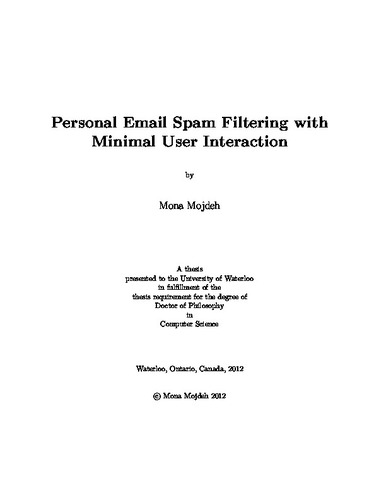| dc.contributor.author | Mojdeh, Mona | |
| dc.date.accessioned | 2012-04-30 14:14:12 (GMT) | |
| dc.date.available | 2012-04-30 14:14:12 (GMT) | |
| dc.date.issued | 2012-04-30T14:14:12Z | |
| dc.date.submitted | 2012 | |
| dc.identifier.uri | http://hdl.handle.net/10012/6675 | |
| dc.description.abstract | This thesis investigates ways to reduce or eliminate the necessity of user input to
learning-based personal email spam filters. Personal spam filters have been shown in
previous studies to yield superior effectiveness, at the cost of requiring extensive user training which may be burdensome or impossible.
This work describes new approaches to solve the problem of building a personal
spam filter that requires minimal user feedback. An initial study investigates how well a personal filter can learn from different sources of data, as opposed to user’s messages. Our initial studies show that inter-user training yields substantially inferior results to
intra-user training using the best known methods. Moreover, contrary to previous
literature, it is found that transfer learning degrades the performance of spam filters when the source of training and test sets belong to two different users or different times.
We also adapt and modify a graph-based semi-supervising learning algorithm to
build a filter that can classify an entire inbox trained on twenty or fewer user judgments.
Our experiments show that this approach compares well with previous techniques when
trained on as few as two training examples.
We also present the toolkit we developed to perform privacy-preserving user studies
on spam filters. This toolkit allows researchers to evaluate any spam filter that conforms to a standard interface defined by TREC, on real users’ email boxes. Researchers have access only to the TREC-style result file, and not to any content of a user’s email
stream.
To eliminate the necessity of feedback from the user, we build a personal autonomous filter that learns exclusively on the result of a global spam filter. Our laboratory experiments show that learning filters with no user input can substantially
improve the results of open-source and industry-leading commercial filters that employ no user-specific training. We use our toolkit to validate the performance of the
autonomous filter in a user study. | en |
| dc.language.iso | en | en |
| dc.publisher | University of Waterloo | en |
| dc.subject | Spam Filtering | en |
| dc.subject | User Study | en |
| dc.title | Personal Email Spam Filtering with Minimal User Interaction | en |
| dc.type | Doctoral Thesis | en |
| dc.pending | false | en |
| dc.subject.program | Computer Science | en |
| uws-etd.degree.department | School of Computer Science | en |
| uws-etd.degree | Doctor of Philosophy | en |
| uws.typeOfResource | Text | en |
| uws.peerReviewStatus | Unreviewed | en |
| uws.scholarLevel | Graduate | en |

